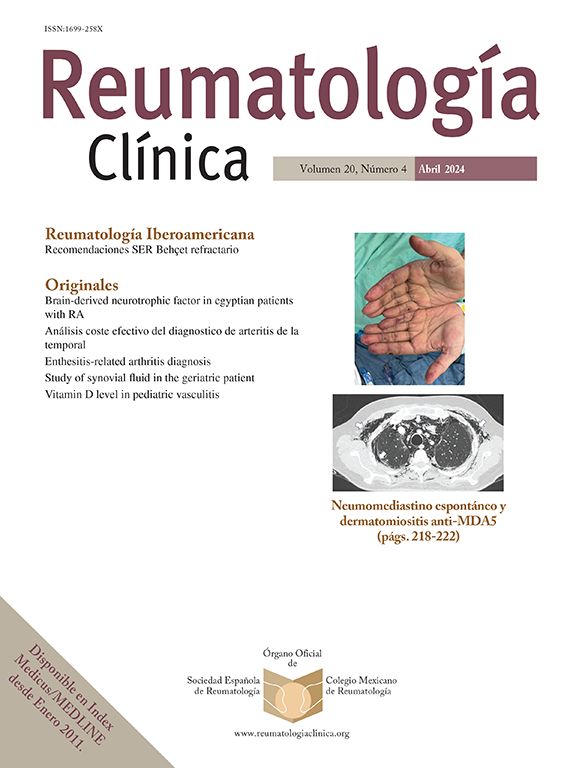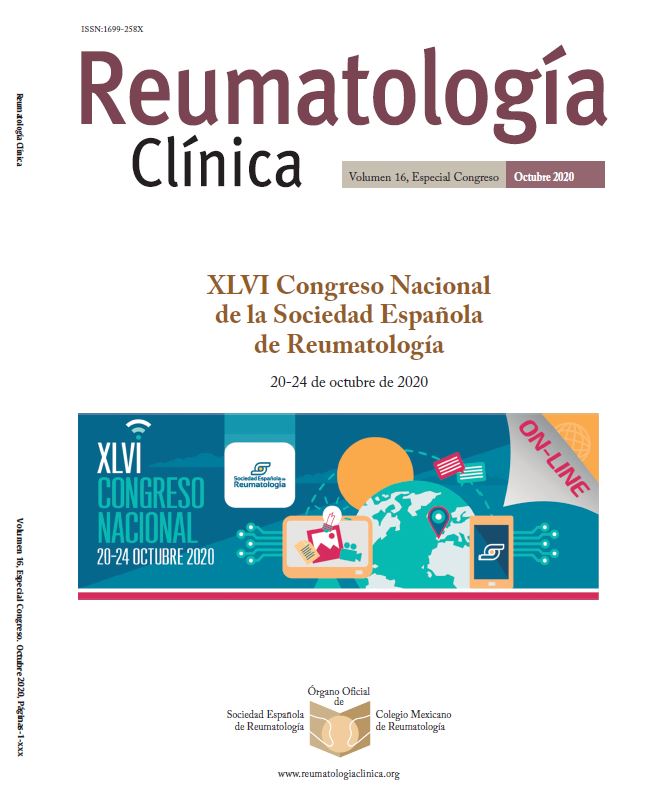CO06 - RISK FACTORS ASSOCIATED WITH RENAL INVOLVEMENT IN PRIMARY SJÖGREN’S SYNDROME: DATA FROM THE SPANISH SJÖGRENSER COHORT
1Servicio de Reumatología. Hospital Universitario de Bellvitge. Barcelona. 2Servicio de Reumatología. Unidad de Investigación de la SER. 3Servicio de Reumatología. Hospital Puerta de Hierro. Madrid. 4Servicio de Reumatología. Hospital Marqués de Valdecilla. Santander. 5Servicio de Reumatología. Hospital Germans Trias i Pujol. Badalona. 6Servicio de Reumatología. Hospital Marina Baixa. Villajoyosa. 7Servicio de Reumatología. Hospital Santa Maria. 8Servicio de Reumatología. Hospital de la Princesa. Madrid. 9Servicio de Reumatología. Hospital de Albacete. 10Servicio de Reumatología. Hospital de Basurto. 11Servicio de Reumatología. Hospital Virgen de las Nieves. Granada. 12Servicio de Reumatología. Hospital General de Jerez de la Frontera. 13Servicio de Reumatología. Hospital Universitario de Canarias. Tenerife. 14Servicio de Reumatología. Hospital Virgen de la Salud. Toledo. 15Servicio de Reumatología. Hospital Gregorio Marañón. Madrid.16Servicio de Reumatología. Hospital Carlos Haya. Málaga. 17Servicio de Reumatología. Hospital General de Alicante. 18Servicio de Reumatología. Hospital Virgen de la Concha. Zamora. 19Servicio de Reumatología. Hospital Parc-Taulí. Sabadell. 20Servicio de Reumatología. Hospital Madrid Norte Sanchinarro. Madrid. 21Servicio de Reumatología. Hospital Doctor Negrín. Las Palmas. 22Servicio de Reumatología. Hospital Doce de Octubre. Madrid. 23Servicio de Reumatología. Complejo Hospitalario de Pontevedra. 24Servicio de Reumatología. Hospital Clínico San Cecilio. Granada. 25Servicio de Reumatología. Hospital de Meixoeiro. Vigo. 26Servicio de Reumatología. Hospital de Valme. Sevilla. 27Servicio de Reumatología. Hospital de León. 28Servicio de Reumatología. Hospital Infanta Sofía. Madrid. 29Servicio de Reumatología. Hospital de L'Hospitalet. 30Servicio de Reumatología. Hospital Sant Joan Despí. 31Servicio de Reumatología. Hospital Miguel Servet. Zaragoza. 32Servicio de Reumatología. Hospital Ramón y Cajal. Madrid. 33Servicio de Reumatología. Hospital de Sant Pau. Barcelona. 34Servicio de Reumatología. Hospital Príncipe de Asturias. Madrid. 35Servicio de Reumatología Hospital de Donostia.
Objectives: To investigate the prevalence, risk factors, and effects of primary renal disease on morbidity and mortality in patients with primary Sjögren’s syndrome (pSS).
Methods: All patients in the SJÖGRENSER cohort were retrospectively investigated for the presence of clinically significant renal involvement directly related to pSS activity.
Results: Of the 437 patients investigated, 39 (9%) presented overt renal involvement during follow-up. Severe renal disease necessitating kidney biopsy was relatively rare (23%). Renal involvement may complicate pSS at any time during the disease course: in 18% of cases, renal disease was the presenting manifestation that led to the diagnosis of pSS; in 26% it was present at diagnosis or appeared within the first 2 years of disease, and in 56% renal disease was a late manifestation. In our registry, patients with clinically significant renal involvement were significantly older than patients without this complication (p = 0.04) and showed a longer disease duration (11.8 years vs 7.9 years, p = 0.007). Additionally, these patients showed higher prevalence rates of ocular complications including corneal ulceration (p < 0.001) and chronic posterior blepharitis (p = 0.03), glandular inflammation (salivary gland enlargement; p = 0.02), myopathy (p = 0.01), Raynaud’s phenomenon (p = 0.05), non-vasculitic cutaneous involvement (p < 0.001), vasculitis (p = 0.04), lung disease (p = 0.004), peripheral neuropathy (p = 0.008), and lymphoma (p = 0.006). Furthermore, we observed statistically significant differences in the immunological profile of these patients who showed higher prevalence of anti-La/SSB (p < 0.001) and RF positivity (p = 0.005), C4 hypocomplementemia (p = 0.01), hypergammaglobulinemia (p = 0.01), and cryoglobulin positivity (p = 0.08). Patients with renal involvement also showed higher ESSDAI scores (9 ± 9 vs 4 ± 5, p < 0.001) and SSDAI scores (4 ± 2 vs 2 ± 2, p < 0.001) at the last visit (at enrollment in the registry). The ESSPRI scores were similar in both groups (5.4 ± 2 vs 5.2 ± 2.3, p = 0.561). Multivariate analysis showed that older age (odds ratio [OR]: 1.03, 95% confidence interval [CI]: 1.00-1.07), higher ESSDAI scores (OR: 1.1, CI: 1.03-1.18), serum anti-La/SSB positivity (OR: 6.44, CI: 1.36-30.37), and non-vasculitic cutaneous involvement (OR: 8.64, CI:1.33-55.90) were independently associated with this complication. Chronic renal failure (CRF) developed in 23 of 39 patients (59%); only 1 of them progressed to end-stage renal disease necessitating renal replacement therapy. Patients with renal disease showed higher SSDDI (Sjögren’s syndrome disease damage index) scores, higher rates of hospitalization due to disease activity (p = 0.004) and higher rates of clinically relevant comorbidities, including hypertension (p = 0.001), dyslipidemia (p = 0.01), ischemic cardiac disease (p = 0.004), and osteoporotic fractures (p = 0.08) that are attributable to corticosteroid therapy and the development of CRF in many patients).
Conclusions: Renal involvement is an uncommon complication in pSS that was observed in 9% of patients. In most cases, it occurs in the setting of previous or concomitant extraglandular manifestacions. Although categorized as a non-negligible comorbidity, this condition shows a favorable prognosis. We identified several risk factors associated with renal involvement in pSS, none of them modifiable, although this categorization can help to identify patients who require careful workup for renal function.







